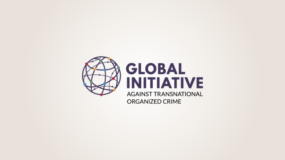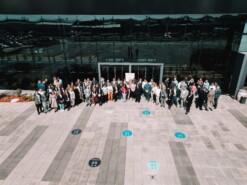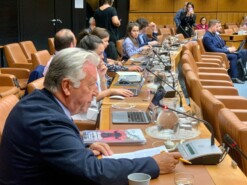The Global Initiative Against Transnational Organized Crime and Instituto Prensa y Sociedad collaborate to uncover links between criminal networks in Latin America and the Western Balkans.
- For years, Balkan nationals have facilitated cocaine shipments from Colombia, Ecuador and Brazil to the US and Europe.
- Balkan cartel emissaries have travelled to Latin American countries to cooperate with local mafia groups, negotiate prices and arrange shipments of cocaine.
Since 2003, cocaine production has more than doubled, generating billions of euros in drug money for European criminal networks. Balkan nationals and their counterparts in Latin American criminal organizations have been working together for years in the transcontinental cocaine trade. The purity of cocaine seized in Europe has increased to 90% over the last decade. Reportedly, drug consignments have been trafficked mainly by concealing them among banana freight containers, though traffickers are becoming increasingly sophisticated and changing their modes of transporting cocaine. The drugs are generally shipped to major Western European ports, including in Spain and Belgium, as well as in South Eastern Europe, and are then redistributed to other consumer countries in Europe.
A new initiative in collaboration between the Global Initiative Against Transnational Organized Crime (GI-TOC) and Instituto Prensa y Sociedad (IPYS), a Peruvian civil society organization, aims to identify, map and report on links between these criminal groups in Latin America and the Western Balkans.
The programme will initially build a network of journalists in both regions, providing them with the tools to research the networks that span these two regions. The role of the IPYS will be to help identify journalists in Latin America for the programme and organize training sessions to provide them with the research methodologies for investigating organized crime. Training will also cover the dynamics that have given rise to the involvement of Western Balkans criminal groups in cocaine trafficking. To conclude the initiative, the GI-TOC will publish a report on the transcontinental criminal flows that assesses the illicit drug trade as well as how it impacts development and governance at the local level in both regions.
This partnership reflects the GI-TOC’s commitment to building the evidence base around transnational organized crime that underpins the development of new strategic policy and programmatic approaches to addressing organized crime at local, national and international levels. It is an output of the Observatory of Illicit Economies in South Eastern Europe, a GI-TOC regional platform that connects and empowers analysts and civil society actors in Albania, Bosnia and Herzegovina, Kosovo, Montenegro, North Macedonia and Serbia. The Observatory aims to enable civil society to identify, analyze and map criminal trends, and their impact on illicit flows, governance, development, interethnic relations, security and the rule of law, and supports them in their monitoring of national dynamics and wider regional and international organized-crime trends.
The focus of the GI-TOC in Latin America is to advance policies that counter organized crime and build community resilience through a human-rights approach. The organization has supported community-based projects in nine countries in the region. Journalists are a crucial community – their recognition, support and engagement have always been an important part of the GI-TOC’s work.
The partnership underlines and supports the important role played by civil society in addressing the threat of organized crime, and adopting transnational networked approaches in the effort to counter it by catalyzing meaningful policy action.
Adriana Leon, Director of Freedom of Information at the IPYS, said: ‘This project will be a valuable contribution to the professionalization of Latin American journalism dedicated to covering organized crime. We are enthusiastic about the challenge of establishing a network of journalists that will spearhead transnational investigations on the subject. We are confident that the results will be illuminating and regional in their impact.’
Mark Shaw, Director, GI-TOC, said: ‘At the core of the GI-TOC’s activities in the Western Balkans is its engagement with media. Journalists are key partners when it comes to gathering information and raising awareness of the impact of organized crime on local communities, and in strengthening resilience. We are very excited to expand this work in Latin America by creating networks to counter networks.’
Find out more:
For further questions, please contact Ana Castro (GI-TOC) at latam@globalinitiative.net; or Fatjona Mejdini (GI-TOC) at Fatjona.Mejdini@globalinitiative.net; or Adriana León (IPYS) at aleonca27@gmail.com.
About GI-TOC
The Global Initiative Against Transnational Organized Crime is a network of professionals working on the front lines of the fight against the illicit economy and criminal actors. Through a network of global civil society observatories on the illicit economy, we monitor evolving trends and work to build the evidence basis for policy action, disseminate the expertise of our Network and catalyze multisectoral and holistic responses across a range of crime types. With the Global Initiative’s Resilience Fund, we support community activists and local NGOs working in areas where crime governance is critically undermining people’s safety, security and life chances.
About IPYS
The Instituto Prensa y Sociedad, based in Lima, Peru, is a civil society organization that promotes investigative journalism, freedom of expression and access to public information in Latin America. IPYS is interested in promoting freely available journalism with high standards so that society has access to quality information. In this way, citizens will be able to adequately exercise their civil, political and economic rights.
Global Initiative Against Transnational Organized Crime y el Instituto Prensa y Sociedad colaboran para identificar los vínculos entre las redes criminales de Latinoamérica y los Balcanes Occidentales.
- Durante años, habitantes de los Balcanes han facilitado el envío de cocaína desde Colombia, Ecuador y Brasil hacia los Estados Unidos y Europa.
- Emisarios de los carteles balcánicos han viajado a países latinoamericanos para colaborar con grupos mafiosos locales, negociar precios y organizar envíos de cocaína.
Desde el 2003, la producción de cocaína ha crecido más del doble y ha generado miles de millones de euros para las redes criminales europeas. Delincuentes de los Balcanes y sus contrapartes en organizaciones criminales latinoamericanas han trabajado en conjunto durante años en el comercio transcontinental de cocaína. Por otra parte, durante la última década, la pureza de la cocaína decomisada en Europa ha aumentado al 90 %. Según informes, los envíos de droga se han traficado principalmente ocultándolos en contenedores con cargamentos de plátano, sin embargo, los traficantes se han vuelto más sofisticados y han modificado la forma en que transportan la cocaína. La droga es generalmente enviada a los principales puertos de Europa Occidental, incluyendo España y Bélgica, así como el sudeste de Europa, para luego ser distribuida a otros países consumidores en Europa.
Una nueva iniciativa de colaboración entre Global Initiative Against Transnational Organized Crime (GI-TOC) y el Instituto Prensa y Sociedad (IPYS), organización de la sociedad civil peruana, pretende identificar, mapear e informar sobre los vínculos entre estos grupos criminales en Latinoamérica y los Balcanes Occidentales.
En un inicio, el programa construirá una red de periodistas proporcionándoles herramientas que les ayuden a investigar las redes que cubren ambas regiones. El papel del IPYS será el de identificar periodistas en Latinoamérica que participen en el programa y organizar capacitaciones para dotarles de metodologías para la investigación del crimen organizado. Esta capacitación también cubrirá las dinámicas que han permitido el crecimiento de la participación de grupos de los Balcanes Occidentales en el tráfico de cocaína. Para concluir la iniciativa, GI-TOC publicará un informe sobre los flujos criminales transcontinentales que van más allá del tráfico ilícito de drogas, y que impactan el desarrollo y la gobernanza a nivel local en ambas regiones.
Esta alianza refleja el compromiso de GI-TOC con la creación de una base de evidencia en torno al crimen organizado transnacional que sustente el desarrollo de nuevos enfoques políticos y normativos estratégicos para hacer frente al crimen organizado a nivel local, nacional e internacional. Es un resultado del Observatorio de las Economías Ilícitas en el Sudeste de Europa, una plataforma regional de GI-TOC que conecta y capacita a analistas y actores de la sociedad civil en Albania, Bosnia y Herzegovina, Kosovo, Montenegro, Macedonia del Norte y Serbia. El Observatorio tiene como objetivo permitir a la sociedad civil identificar, analizar y mapear las tendencias criminales y su impacto en los flujos ilícitos, la gobernanza, el desarrollo, las relaciones interétnicas, la seguridad y el Estado de derecho, y apoyarla en su seguimiento de la dinámica nacional y de las tendencias más amplias del crimen organizado a nivel regional e internacional.
El objetivo de GI-TOC en Latinoamérica es avanzar en políticas que contrarresten al crimen organizado y construyan resiliencia comunitaria a través de un enfoque basado en derechos humanos. La organización ha apoyado proyectos comunitarios en nueve países de la región. Los periodistas conforman una comunidad crucial, su reconocimiento, apoyo y compromiso siempre han sido parte fundamental del trabajo de GI-TOC.
Esta colaboración destaca y apoya el importante papel de la sociedad civil para enfrentar la amenaza del crimen organizado, y adoptar enfoques de redes transnacionales en el esfuerzo por contrarrestarla a través de acciones políticas significativas.
Adriana León, directora de información de IPYS, señaló: «Este proyecto será una contribución valiosa a la profesionalización del periodismo que se dedica a cubrir al crimen organizado en Latinoamérica. Estamos muy entusiasmados con el reto de establecer una red de periodistas que encabece investigaciones transnacionales sobre el tema. Confiamos que los resultados sean reveladores y que tengan un impacto regional».
Mark Shaw, director de GI-TOC, agregó: «El compromiso con los medios de comunicación está al centro de las actividades que GI-TOC realiza en los Balcanes Occidentales. Los periodistas son aliados clave a la hora de recopilar información y concientizar sobre el impacto del crimen organizado en las comunidades locales, y de fortalecer la resiliencia. Nos entusiasma mucho la idea de extender este trabajo en Latinoamérica creando redes que contrarresten redes».
Más información:
Para mayor información, favor de contactar a Ana Castro (GI-TOC) en latam@globalinitiative.net, Fatjona Mejdini (GI-TOC) en Fatjona.Mejdini@globalinitiative.net o Adriana León (IPYS) en aleonca27@gmail.com.
Acerca de Global Initiative Against Transnational Organized Crime
Global Initiative Against Transnational Organized Crime (GI-TOC) es una red de profesionales que trabajan al frente de la lucha contra los mercados ilegales y los actores criminales. A través de una red internacional de observatorios de la sociedad civil en economías ilícitas, monitoreamos la evolución de las tendencias y trabajamos en la construcción de una base empírica para la acción política, difundimos la experiencia de nuestra Red y promovemos respuestas multisectoriales y holísticas para un amplio rango de crímenes. Con el Fondo Resiliencia, apoyamos a activistas comunitarios y ONGs locales que trabajan en zonas donde la gobernanza criminal socava de forma crítica la seguridad y las decisiones de vida de las personas.
Acerca de IPYS
El Instituto Prensa y Sociedad, basado en Lima, Perú, es una organización civil que promueve el periodismo de investigación, la libertad de expresión y el acceso a la información pública en América Latina. Al IPYS le interesa promover un periodismo libre y de altos estándares profesionales a fin de que la sociedad tenga información plural y de calidad. De esta manera los ciudadanos podrán ejercer adecuadamente sus derechos civiles, políticos y económicos.



